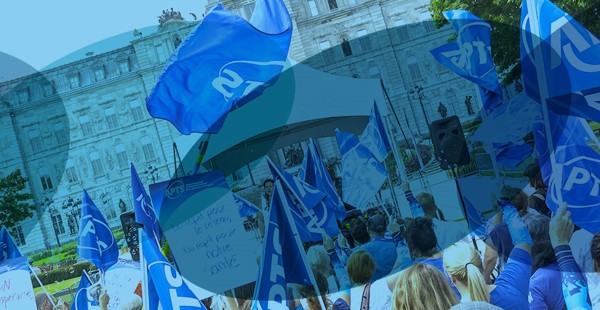420,000 Front commun workers now have the floor
January 7, 2024

Montréal – After weeks of intensive bargaining talks, and having consulted its intermediate decision-making bodies, the Front commun can now confirm that the tentative deal reached with Québec in late December will be submitted to union members represented by the Front commun.
“Our members now have the floor,” said CSN first vice-president François Enault, CSQ president Éric Gingras, FTQ president Magali Picard and APTS president Robert Comeau, speaking on behalf of the Front commun at a press conference today. “The details of the agreement will be presented to them in general assemblies, and it will be their move. And yes, of course, wages are a big issue – but the proposal they’ll be looking at has other valuable elements. It’s important to see the agreement as a whole. Gains achieved at the central bargaining table are added to those obtained at sectoral tables regarding conditions of work and practice. We’ll be seeing some very important debates within our unions over the next weeks.”
“It’s got to be said: this round of bargaining talks has not been easy,” added the union leaders. “It’s still too early to put the last year and a half in perspective. But one thing is clear – our members’ powerful mobilization, across Québec, is what made the government understand the needs of our public systems. A huge amount of work was carried out, on a daily basis, at many different levels. Away from the media spotlight, workers from the very beginning consolidated actions on the ground, made the Front commun visible, made our demands known and helped spread our message. Today, we want to applaud them and give them our heartfelt thanks.”
In terms of wages, the deal provides for an increase of 17.4% over 5 years for all workers in all sectors. Importantly, a 6% raise retroactive to April 1, 2023, will be given for the first year if the deal is accepted. This will be the largest annual pay increase achieved in decades.
The Front commun recalled that the government’s offer stood at 9% over 5 years in December 2022, 10.3% in October 2023, and 12.7% on December 6, 2023. At 17.4%, the current offer is the largest increase since 1979 over the period of a collective agreement. To this increase is added a clause to protect purchasing power that may provide up to 1% more for each of the last three years of the collective agreement.
In addition to wage increases, the tentative deal includes other improvements to the collective agreement in terms of vacation leave, retirement, group insurance, parental rights and other issues. Here are some of these gains.
- The right to a 5th week of vacation leave will be achieved after 15 years’ service, continuous service or seniority, depending on the collective agreement, and the full 5th week will be obtained at 19 years’ seniority rather than 25.
- Improvements to the retirement system include the possibility of extending a phased retirement plan over 7 years.
- Improvements to the parental rights plan include adding an extra day to the bank of special leave days for pregnancy.
- The employer will make a bigger contribution to the health insurance plan.
- The 10% premium designed to attract and retain skilled workers, in order to counteract the labour shortage, will go up to 15%.
- Psychologists in all public systems will receive a 10% pay increase that will be taken into account by the pension plan.
General assemblies will be convened by over 300 Front commun unions between January 15 and February 19, 2024.
“We are tremendously proud of having contributed to this historic movement, speaking with one voice as the Front commun,” said the union leaders. “We made the right move when we chose to come together in solidarity. Right from the beginning, as we were establishing the Front commun, we said we were doing what our members wanted and that was the most important thing. To see how quickly they appropriated it was, and will remain, one of the most significant moments in the history of our organizations. And the support we received from Quebecers has also been crucial. They too, in a way, have been speaking with one voice with the massive support they’ve given to our workers’ demands. Our heartfelt thanks go to them, too.”
The Front commun
Together, the CSN, CSQ, FTQ and APTS represent over 420,000 public-sector workers who are employed by the Québec government in schools, health and social services, and higher education.

